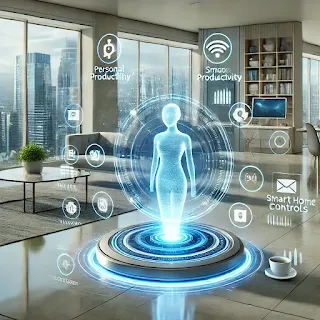Revolutionizing Everyday Life and Business Artificial Intelligence (AI) assistants have gone from futuristic concepts to indispensable tools...
Revolutionizing Everyday Life and Business
Artificial Intelligence (AI) assistants have gone from futuristic concepts to indispensable tools in our modern world. Whether you're managing tasks, controlling smart home devices, or streamlining customer service operations, AI assistants are everywhere. With their ability to understand natural language, learn from user interactions, and perform complex tasks, these digital helpers have transformed how we live and work.
In this blog post, we’ll dive into the evolving landscape of AI assistants, their impact on various industries, and how they are shaping the future of productivity, business, and personal life.
What Are AI Assistants?
AI assistants are software programs that leverage artificial intelligence to perform tasks or provide services based on user commands or requests. They can respond to voice commands, interact with users via text, and even automate routine activities. These virtual assistants are powered by machine learning, natural language processing (NLP), and data analytics to understand, learn, and anticipate user needs.
Some well-known AI assistants include:
- Siri (Apple)
- Alexa (Amazon)
- Google Assistant (Google)
- Cortana (Microsoft)
- Bixby (Samsung)
These AI-driven tools can do everything from sending text messages and setting reminders to managing complex workflows and providing personalized recommendations.
How AI Assistants Work
At the heart of every AI assistant is a combination of advanced technologies that allow it to interact seamlessly with users. Here are the core components:
Natural Language Processing (NLP): AI assistants use NLP to interpret and understand human language, converting spoken or written words into actionable commands.
Machine Learning (ML): As users interact with AI assistants, they learn from the data and adapt to preferences, improving responses and functionality over time.
Voice Recognition: This technology allows AI assistants to process and respond to voice commands. By recognizing distinct speech patterns, they can personalize interactions to individual users.
Data Integration: AI assistants are often integrated with a range of services and applications, such as email, calendars, smart devices, and cloud platforms, enabling them to provide real-time information and carry out tasks efficiently.
Use Cases of AI Assistants
AI assistants have permeated nearly every aspect of daily life and business. Let’s explore some of the most common applications:
1. Personal Productivity
For many users, AI assistants act as productivity companions. From setting reminders, managing to-do lists, and scheduling appointments, these tools can handle mundane tasks with minimal effort.
For example, Google Assistant can:
- Provide daily weather updates
- Suggest the fastest route to work based on real-time traffic
- Send messages, make calls, or even read emails
AI assistants are particularly helpful for time management. Instead of switching between multiple apps, users can rely on a single interface to manage everything seamlessly.
2. Smart Homes
Smart home technology is a growing trend, and AI assistants are at the forefront of this revolution. Integrated with smart devices, AI assistants can control lighting, thermostats, security systems, and even appliances.
Amazon's Alexa and Google Assistant, for instance, can:
- Adjust the temperature of your home with a simple voice command
- Turn off lights or lock doors when you’re away
- Play music, read news headlines, or stream your favorite shows
The convenience and efficiency of smart home assistants make everyday tasks easier, saving both time and energy.
3. Customer Service and Business Automation
AI assistants are making waves in the business world, particularly in customer service. Many companies have implemented AI-powered chatbots and virtual assistants to handle routine inquiries, allowing human agents to focus on more complex issues.
Benefits of AI in customer service include:
- 24/7 Availability: AI assistants never sleep, offering round-the-clock support to customers.
- Cost Savings: By automating repetitive tasks, businesses can reduce the need for human staff, saving on labor costs.
- Personalized Support: AI assistants can analyze customer data and provide tailored responses, creating a more personalized experience.
One example is the use of AI assistants in e-commerce. Virtual shopping assistants can help customers navigate websites, suggest products, and answer questions about pricing and availability, all in real time.
4. Healthcare and Wellness
AI assistants are playing a crucial role in healthcare, offering everything from appointment scheduling to symptom checking. These tools can track health metrics, remind patients to take medications, and even provide mental health support.
For instance, AI wellness apps like Woebot and Wysa offer conversational support for managing stress, anxiety, and depression. Meanwhile, AI-powered systems like IBM Watson are being used in hospitals to assist doctors with diagnostics and treatment recommendations.
The Impact of AI Assistants on Businesses
AI assistants aren't just changing the way individuals manage their day-to-day lives—they're also revolutionizing industries. Here are a few ways AI assistants are reshaping the business landscape:
1. Boosting Efficiency and Reducing Costs
Businesses across sectors are adopting AI assistants to streamline operations. For instance, HR departments use AI to automate administrative tasks such as scheduling interviews or onboarding new employees. AI can also analyze large datasets to identify patterns and provide insights, enabling data-driven decision-making.
Additionally, AI assistants can reduce the workload on employees, allowing them to focus on more strategic tasks. This shift in focus increases overall productivity while reducing operational costs.
2. Enhancing Customer Experiences
Customer experience is a key differentiator in today's competitive marketplace. AI assistants enable businesses to offer personalized, responsive, and efficient service. Whether through chatbots that answer FAQs or virtual agents that resolve complex queries, AI is improving how companies interact with their customers.
AI assistants can also analyze customer feedback and behavior to provide actionable insights, helping companies fine-tune their strategies and deliver more engaging experiences.
3. Driving Innovation in Marketing
AI assistants are helping marketers reach and engage their target audiences more effectively. With the ability to analyze consumer behavior in real time, AI can recommend personalized products or services, optimize ad campaigns, and automate social media interactions.
For example, AI assistants can monitor user behavior on websites, making real-time product recommendations based on previous purchases or browsing history. This level of personalization drives conversions and fosters stronger customer relationships.
The Future of AI Assistants
As AI technology continues to evolve, the potential of AI assistants will only expand. One significant area of development is contextual understanding. Currently, most AI assistants respond to specific, direct commands. However, future iterations may be capable of more nuanced conversations, understanding context and intent with greater accuracy.
Another exciting advancement is multimodal interaction, where AI assistants can process not only text and voice but also images and gestures. This would allow users to interact with assistants in a more natural, intuitive way, further enhancing the user experience.
Additionally, AI assistants will likely become even more integrated into the fabric of daily life and business. With the rise of AI-driven automation and predictive analytics, AI assistants may anticipate needs before users even express them, offering proactive solutions to problems and challenges.
Embracing AI Assistants in Your Life and Business
AI assistants are no longer just convenient tools—they’re becoming essential companions in personal and professional life. Whether you're using them to optimize productivity, enhance customer service, or automate routine tasks, these digital helpers have immense potential.
As AI continues to advance, the possibilities for AI assistants will grow, offering even more ways to enhance efficiency, improve experiences, and drive innovation across industries.
So, if you haven’t already embraced AI assistants, now is the perfect time to explore their benefits. With the right AI assistant by your side, you can unlock new levels of convenience, productivity, and success.













.png)


COMMENTS